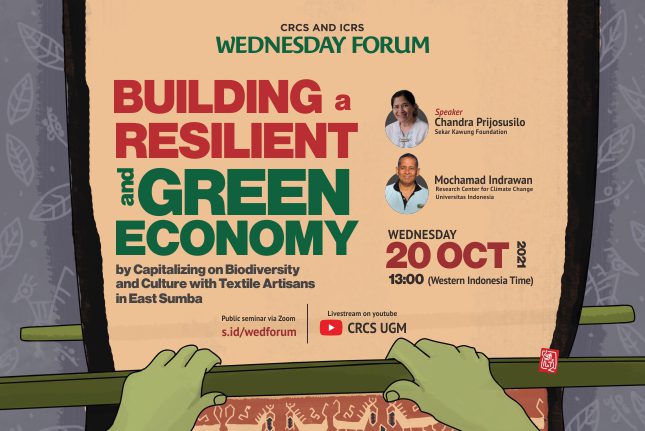
Building A Resilient and Green Economy by Capitalizing on Biodiversity and Culture with Textile Artisans in East Sumba
Wednesday Forum – 20 October 2021
The talk will present the case of working with Paluanda Lamu tenun ikat (woven cloth) Artisans in East Sumba, Indonesia, participatory exploring how biodiversity and culture can fuel economic prosperity. Formerly, those traditional hand-woven textiles were worn for community gatherings such as the birth, marriage, or death of a community member. As many Paluanda Lama Hamu members do not own much land, and fully depend on making woven cloth, together with Sekar Kawung, they nurtured new economic activities for sustainable livelihoods. The community was taken on various activities and approaches, such as documenting the creative process, creating a photo voice for children, establishing an ecotourism scheme, and integrating woven cloth into formal education curriculum. Those aims are to strengthen their cultural identity and to confirm its position in the ethnic arts trade, also to promote the restoration of degraded lands using natural dye trees and plants.
Chandra Prijosusilo, Sekar Kawung Foundation founder learned a love for plants from her father and for books from her mother. She holds a degree in prychology from UGM followed by a course on Listening to Nature from Schumacher College, England. Her work explores the nexus between biodiversity and culture to create green economies with village communities in Indonesia.
Mochammad Indrawan is a Research Scientist (Conservation Biology & Social Forestry) at RCCC-UI. He has been a research associate at Kansas University, USA, and visiting scholar at Kyushu University, Japan. He is also the lead editor of the book Civil Engagement in Asia which voices a more critical view of the SDGs, involving activists and public intellectuals from ASEAN and Japan.
The full poster of this event is available here.
To join the event click here

